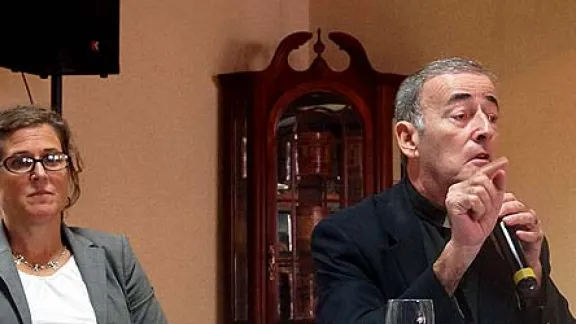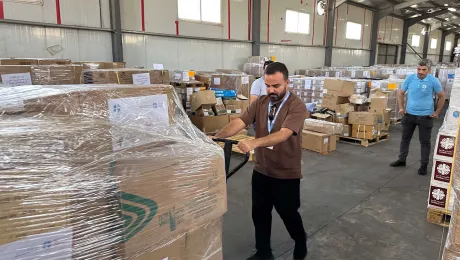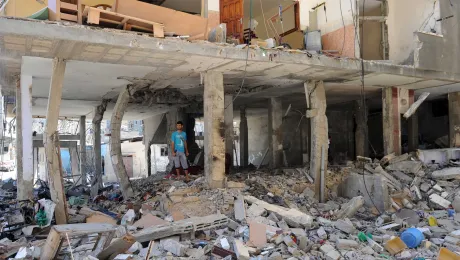
Ms Eva Ekelund (left) LWF regional representative in Central America and Rev. Ãngel Furlan (right) addressed the forum on
LWF Partners in Central America Say Public Debt Leads to Structural Violence
The Social Forum on the External Debt of Honduras (FOSDEH) and other non-governmental organizations in the Central American country say Honduras is on the brink of ruin. It cannot pay government employees, contractors or suppliers. Construction unions owed more than USD 100 million by the State are demanding payment. Teachers can go up to six months without salaries. Road construction has stopped and the government health provider is threatening to dismiss employees.
Concerned about the situation in Honduras, The Lutheran World Federation (LWF) Department for World Service (DWS) program in Central America and its partner FOSDEH jointly hosted a forum in mid-April on “Public Debt and Structural Violence.”
The gathering held in the capital Tegucigalpa, focused on indebtedness among Latin America countries and discussed foreign debts that have been incurred without the consent of the population but with the creditors’ full awareness. This is relevant in Honduras whose government debt according to the Central Bank of Honduras is 47 percent of the GDP. But according to Raf Flores, FOSDEH deputy coordinator, the actual figure had reached almost 71 percent of the GDP. FOSDEH argues that the Honduran government does not take all its debts into account.
Participants in the “Public Debt and Structural Violence” forum included representatives of the Christian Lutheran Church of Honduras (ICLH) and the regional LWF Illegitimate Debt Program. Rev. Ángel Furlan, coordinator of the illegitimate debt program for LWF member churches in Latin America, referred to the debt system as modern slavery. The Honduran debt has made the country extremely vulnerable and caused a completely unsustainable situation affecting mainly the poor and causing social violence, he emphasized.
“It is not a mere crisis. It is a system failure. We need to talk about debt as a system that leads to modern slavery. The debt itself is a system of modern slavery,” said Furlan, former president of the United Evangelical Lutheran Church (IELU) in Argentina.
Poverty Has Increased
Furlan’s message is clear. The current economic development model is based on growth and it has used debt as one of the most effective mechanisms for its own survival.
But creditors have applied conditions to their loans, forcing developing countries like Honduras to undergo structural reforms. According to Furlan, most of the costs incurred in debt servicing have been put mainly on the average citizen, therefore deepening poverty and exclusion. Apart from lower salaries in Honduras, subsidies on fertilizers, fuel and transport have been eliminated and tariffs for service delivery including water, energy and communications have been raised. Cuts in public expenditure and reduction of direct taxes on labor, business and heritage tax directly affects the poor, Furlan noted.
Such a situation leads to violence because of social exclusion. Lives are no longer valued. The value of life is traded like goods. Access to education, work, food and a future are taken away, he continued.
“The social violence corresponds to structural violence. Even the Maras criminal gangs, manage to create social acceptance and exclusiveness within the group. But that is an acceptance built on violence,” Furlan said.
Foreign Interests Manage National Well-Being
According to Eva Ekelund, LWF regional representative in Central America, debt puts a heavy weight on countries facing deep socio-economic challenges and hinders the full development and exercise of human rights. Loans and foreign investment that come with conditions have resulted in the weakening of state power.
“Human rights have no conditionality. They are unconditional and can neither be sold nor changed. But the right to development, to employment and to equality between men and women require a state [that is] able to intervene and to guarantee these rights. It requires control of public finances to ensure socio-economic fulfillment,” said Ekelund.
According to FOSDEH, Honduras is now seeking to privately place over USD 750 million in bonds. To do so the government has hired banking firms to set up meetings with potential investors. This system produces international indebtedness of the country, allowing the management and planning of the national economy to be subjected to international agreements of a market dominated by external and private interests.
Economic Transformation Needed
LWF Central America proposes a number of steps toward a just and sustainable future. “Firstly there is a need to build a financial architecture, which aims to change the rationalities of production, distribution and growth patterns that are not based on debt and financial capital efficiency,” said Ekelund.
Furlan emphasized the need for “a true green economy”—an economy that is not based on speculation but instead prioritizes food security, health, renewable energy, inclusion, gender and ethnic justice, human rights and the rights of mother earth.
(By LWI correspondent Thomas Ekelund)


